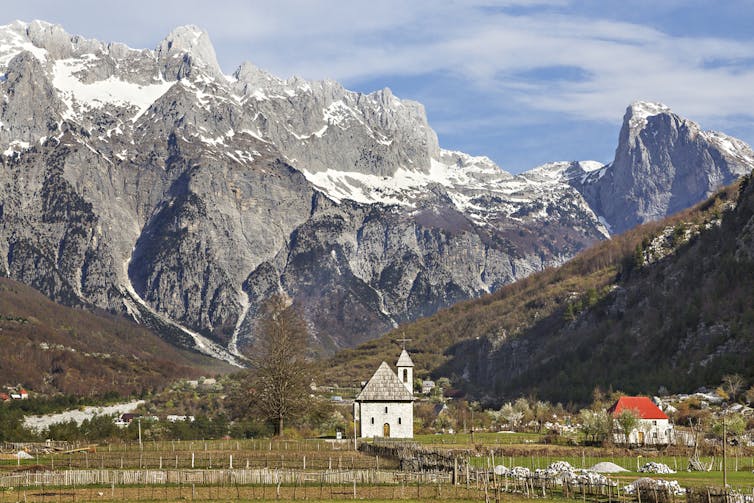
About 46,460 Albanians left the country in 2022. This exodus was 10.5% higher than in 2021, with the majority, about 36,000, being young people, according to new data from the Albanian Institute of Statistics.
This data also shows that fewer Albanian young people are entering the labour force and completing their studies. For example, in the academic year 2021-2022, about 30,910 students graduated from higher education, marking a 5.4% decrease from the previous academic year.
Other sources, such as EU data, suggest families may also be leaving. Enrolment rates for the upcoming academic year 2022-2023 have declined by 4% for pupils in elementary schools.
A significant factor in rising migration is likely to be the high rate of youth unemployment, according to a report from the Westminster Foundation for Democracy. Albania has the second highest youth unemployment in the western Balkans (Albania, Bosnia and Herzegovina, North Macedonia, Montenegro, Kosovo and Serbia).
Unicef reported that about 17% of Albanians aged 18–24 had dropped out of school in 2021–2022, and more than a quarter of those aged 15–24 were neither employed nor enrolled in any education degree.
Overall, Albania’s population has declined every year from 2001 to 2023. Recent polling on the reasons for leaving Albania, conducted by the non-profit foundation SwissContact, and included in a UK home affairs select committee report, suggests that Kukës county in northern Albania has seen more than half of its population emigrate since 1990, with the majority heading to the UK. About 35% of current residents wish to leave Kukës, and 59% want to migrate to the UK, it found.
Economic obstacles
Polling also provided some insights into the Kukës community’s desire to leave. About 37% said it was because of youth unemployment, followed by 35% indicating poverty, but the number one issue was the high cost of living (58%). The latest World Bank report on the region suggests that the pandemic has pushed more than one third of Albanians into poverty.
But Albanians also have the lowest level of disposable income in Europe. According to the latest data by Eurostat, the statistical office of the European Union, the median disposable income in the EU was €18,019 (£15,528) per inhabitant, reaching a high of €32,132 (£27,690) in Luxembourg and just €4,385 (£3,780) in Albania in 2021.

But the repercussions of youth migration and a brain drain are severe and are more apparent than ever in the Albanian healthcare system. According to some reports around 3,500 healthcare personnel have moved to Germany from Albania in the last ten years. The brain drain is also affecting other important sectors such as tourism and agriculture.
In the past five years Germany has attracted many young Albanians, particularly after it introduced the Skilled Immigration Act aiming to bring more highly qualified professionals to Germany to fill industry shortages. Germany has gone further, recently signing agreements with Bosnia and Herzegovina and Kosovo to make employment of healthcare professionals from those countries even easier. In 2022 Germany also began to recognise driving licences from the western Balkans to help fill vacancies for drivers.
Driving migration
The decision to migrate can depend on social and individual circumstances. However, poverty and exclusion are driving forces. Political parties pay little attention to policy that could increase opportunities. For example, in the local election held in May 2023, Albania’s brain drain and youth migration were not discussed in depth.
Albania needs to value its young people differently. They are often seen through the prism of how they contribute to the GDP through money they send home. But a change of policy could make a difference. For example, Ireland experienced a brain drain in the 1990s, losing highly skilled young people to the UK and US.
To tackle this Ireland offered financial guarantees and support for migrants that returned. While Estonia also reversed the trend, remaking its image into one of technological leadership to attract its youth back.
However, Albania cannot tackle the brain drain and youth migration without help. The EU must take responsibility as the key beneficiary of that brain drain and share the burden of finding a solution.
The EU pays little attention to the vast benefits it receives from attracting Albania’s young people. Meanwhile, it has kept Albania waiting for EU membership for more than two decades.
The solution is not to prohibit migration, but to encourage more investment, while also providing the region with access to the EU single market to inject economic growth and opportunities for investment and social development.
The EU has concerns about the western Balkans’ lack of reform on fundamental rights, particularly stopping corruption and having a working and fair legal system, the current rate of migration is jeopardising the region’s future, and by the time all the EU’s reforms are completed, there will be few Albanian young people left.
At the same time, Albania must view its youth not just as contributors to GDP from overseas, but also as a force for social change and a stronger economic future.
Andi Hoxhaj does not work for, consult, own shares in or receive funding from any company or organisation that would benefit from this article, and has disclosed no relevant affiliations beyond their academic appointment.
This article was originally published on The Conversation. Read the original article.







